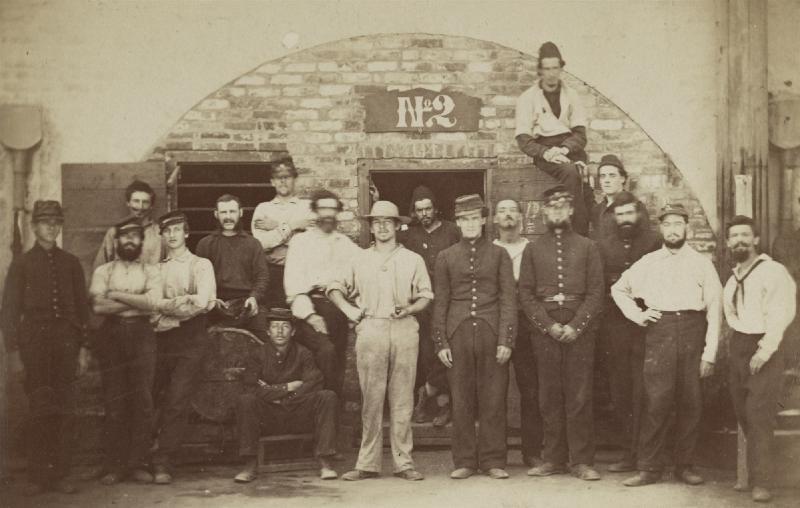Civil War POW study finds a father's stress can alter a son's genetics



It may be hard to imagine a link between the Civil War and the science of heredity, but a provocative new study of the offspring of Union soldiers adds to a growing body of evidence that suggests that traumatic events experienced by one generation can have profound effects on the next.
It’s all part of the growing field of human epigenetics, which examines how our health is shaped by interactions between DNA and our environment .
The study, based on an analysis of National Archives records of Civil War prisoners of war and their families, turned up stories like those of Ellsey Sloan and John Lawson, who survived captivity in the notorious Andersonville prison in Georgia , where crowding, starvation and poor sanitation were rampant.
 The Andersonville prison in Georgia was notoriously brutal, with captives facing problems of overcrowding, starvation and poor sanitation. Library of Congress
The Andersonville prison in Georgia was notoriously brutal, with captives facing problems of overcrowding, starvation and poor sanitation. Library of Congress The findings show that sons of Union soldiers who were held in Confederate prisons had shorter lifespans than the sons of soldiers who avoided imprisonment. But if the research turned up heartbreaking stories, it also showed that some sons of the POWs had normal lifespans — perhaps because their mothers were well nourished during pregnancy. This suggests that it’s possible to mitigate the effects of privation in subsequent generations — a message as relevant today as it was in the 19th century.
“What happens to your ancestors can determine what happens to you, but the effects are reversible,” says Dora Costa, an economist at the University of California, Los Angeles, and lead author of a paper about the research that was published Oct. 15 in the journal Proceedings of the National Academy of Sciences . “It’s not destiny.”
PEERING BACK IN HISTORY
For their research, Costa and her collaborators combed through the records of nearly 20,000 children of Union soldiers from the Civil War , which was fought from 1861 to 1865. The researchers looked at the lives of men in three groups: sons of POWs whose imprisonment had been especially brutal; sons of POWs whose imprisonment had been less extreme; and sons of Union soldiers who had avoided imprisonment.
A striking pattern emerged. Of sons who lived at least to the age of 45, those in the unlucky first group had a 9 percent higher probability of dying in any given year than those in the second group, and an 11 percent higher probability of dying than sons fathered by men who hadn’t been captured. The early deaths were caused mostly by stroke and cancer, according to the researchers.
Previous studies turned up similar cases in which people whose parents survived a harrowing ordeal had an unusually high risk of health problems. For example, it’s well documented that the offspring of survivors of the Dutch Hunger Winter of 1944-45 — In which German forces cut off food supplies to the Netherlands near the end of World War II — experienced high rates of diabetes, schizophrenia and other chronic ailments.
In recent years scientists have started to piece together how this might happen. It’s not that ordeals like starvation changed these people’s genomes (the sum total of a person’s DNA). Rather, it’s that the traumatic events triggered chemical changes in certain compounds attached to DNA, which collectively are known as the epigenome. Scientists think some of these epigenetic changes, which affect which genes are activated and which are silenced, could be passed on to the next generation from the mother or father.


I thought that it was fascinating that what our ancestors lived through could affect generations forward. I would be interested if some of the members could share some stories where this happened to their families.
I don't agree with their conclusions that the ill effects were transferred to the next generation genetically. These Prisoners lived under hellish conditions and many never recovered physically or mentally, this would have lead to high rates of Drug and Alcohol abuse. Mental illness, Spousal abuse, and Poverty and these things we know effect and can be transferred to the next Generation. They mention "some sons of the POWs had normal lifespans — perhaps because their mothers were well nourished during pregnancy" and say this could be a mitigating effect but fail to address the long term socioeconomic effects of Mental and Physical Disabilities caused by their fathers imprisonment. Of course there are always mitigating circumstances like if they owned property prior to the war or inherited they would be in a better position, a very hard working Mom can take up the slack, some would have had the support of extended Family to keep them fed and show them how to live right. There are just to many variables that weren't addressed for me to have any faith in their conclusions.